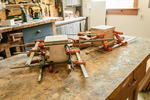We may receive a commission when you use our affiliate links. However, this does not impact our recommendations.

For the many-hundredth time last week, I explained the virtues of simple workbenches to a skeptical audience of 10 workbench builders.
They weren’t having it. Their benches were sketched out with complex tail vises, multiple rows of dogs, twin-screw vises, quick-release vises and other assorted bench appliances. As always, I shrugged my shoulders and smiled when I finished my speech.
Woodworkers at the beginning of their career will always – and I do mean always – opt for the most complex workbench that their brains and hands can handle.
But this class was a bit different. I had a former student assisting me, and he had taken the same workbench class about five years ago.
“Wait,” Brian said to the class. “Chris is right. I was where you were five years ago. You don’t need all this stuff. I wanted it. And now i don’t use it.”
Again, it didn’t matter to the students. They wanted what they wanted. I knew it was useless to debate them further, so we got down to the messy business of moving legs and stretchers to accommodate all manner of vises.
What You Need
The upside to this awkward moment in class was that several of us who have been working for a long time at the bench discussed the topic over a beer that night. All of us (surprisingly) agreed that the single most important piece of workbench equipment was the planing stop.
My planing stop is the most-used bit of bench equipment in my shop. Mine was made by a blacksmith, but if I had to recommend one to a beginner it would be the Benchcrafted planing stop. At just $24, it is a simple and awesome addition to any workbench.
The second-most important piece of equipment: a holdfast. There are lots of good ones, but the best one for the buck is the holdfast from Tools for Working Wood. You get two for $38.95. These work with your planing stop to hold almost anything. Once you get familiar with your planing stop and your holdfast, you might not even need a leg vise for much.
I love my leg vise, but it is seldom used, except for cutting tenons and some odd applications that the planing stop can’t handle.
I know this seems counter-intuitive. Technology should make things easier. But in the case of workbenches, I think new technology makes things more difficult in the long run.
But I don’t expect this blog entry will convince anyone. The only thing that changes people’s minds is spending years at the bench.
So I’ll see you in 20 years or so.
— Christopher Schwarz
Here are some supplies and tools we find essential in our everyday work around the shop. We may receive a commission from sales referred by our links; however, we have carefully selected these products for their usefulness and quality.









